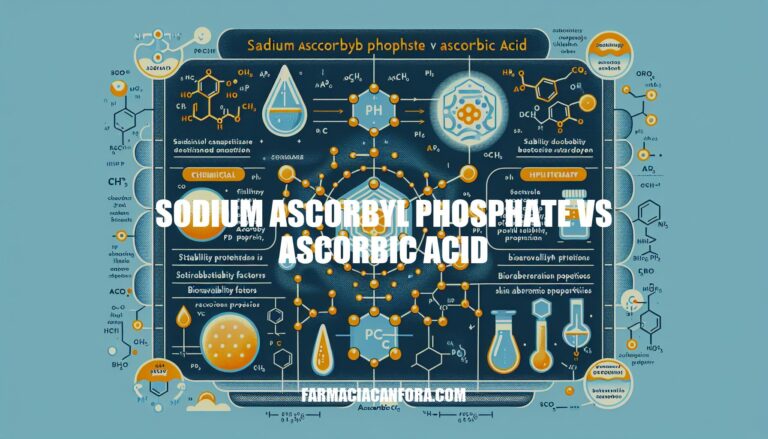Understanding the differences between sodium ascorbyl phosphate and ascorbic acid is crucial for optimizing your skincare routine. Both are forms of vitamin C, but they vary in stability, potency, and skin compatibility. Knowing which one suits your skin type and goals can help you achieve better results and avoid potential irritation.
Chemical Structure and Stability
Let’s dive into the chemical structures and their implications:
Chemical Structures
Stability
Effectiveness in Skincare
In summary, while ascorbic acid is more potent, its instability and potential for irritation make sodium ascorbyl phosphate a more stable and gentle alternative for skincare products.
Skin Benefits
Let’s dive into the skin benefits of Sodium Ascorbyl Phosphate (SAP) and Ascorbic Acid:
Antioxidant Properties
- Sodium Ascorbyl Phosphate: Acts as a powerful antioxidant, neutralizing harmful free radicals that can cause DNA damage and accelerate aging. It’s gentler on the skin, making it suitable for sensitive skin types.
- Ascorbic Acid: Known for its potent antioxidant properties, it provides strong protection against oxidative stress and environmental damage. However, it can be more irritating, especially for sensitive skin.
Brightening Skin
- Sodium Ascorbyl Phosphate: Helps brighten the skin by inhibiting melanin production, which reduces hyperpigmentation and evens out skin tone. It’s effective but works more gradually compared to ascorbic acid.
- Ascorbic Acid: Highly effective at brightening the skin and reducing dark spots due to its potent nature. It delivers quicker results but may cause irritation in some individuals.
Reducing Signs of Aging
- Sodium Ascorbyl Phosphate: Offers anti-aging benefits by promoting collagen production and protecting against free radical damage. It’s less potent but more stable and suitable for long-term use.
- Ascorbic Acid: Stimulates collagen synthesis, which helps reduce fine lines and wrinkles. Its strong anti-aging effects are well-documented, but it requires careful formulation to maintain stability.
Both forms of vitamin C have their unique advantages, so choosing the right one depends on your skin type and specific needs.
Suitability for Different Skin Types
Sodium Ascorbyl Phosphate (SAP):
- Stability: More stable, less likely to oxidize.
- Irritation: Gentler, less irritating.
- Skin Types: Ideal for sensitive, acne-prone, and dry skin.
Ascorbic Acid (AA):
- Potency: More potent, effective antioxidant.
- Stability: Less stable, prone to oxidation.
- Skin Types: Best for normal to oily skin, those seeking strong anti-aging benefits.
Formulation and Usage
Sodium Ascorbyl Phosphate (SAP)
Formulation:
- Water-soluble: SAP is typically formulated in water-based products.
- pH Levels: It is stable at a neutral pH (around 7), making it easier to formulate without the need for acidic conditions.
- Stability: SAP is more stable than ascorbic acid, less prone to oxidation, and has a longer shelf life.
- Application Methods: Suitable for serums, creams, and lotions. It is gentle on the skin, making it ideal for sensitive skin types.
Ascorbic Acid (L-Ascorbic Acid)
Formulation:
- Water-soluble: Ascorbic acid is also formulated in water-based products but requires careful handling.
- pH Levels: Needs to be formulated at a low pH (around 3.5) to remain stable and effective.
- Stability: Highly unstable, prone to oxidation when exposed to light, air, and heat. Often combined with stabilizing agents like ferulic acid and vitamin E.
- Application Methods: Commonly found in serums. Due to its potency and potential for irritation, it is often recommended for use in the morning with sunscreen.
Both forms of vitamin C offer unique benefits and challenges in skincare formulations. The choice between SAP and ascorbic acid depends on the desired stability, skin sensitivity, and specific skincare goals.
Choosing Between Sodium Ascorbyl Phosphate (SAP) and Ascorbic Acid for Skincare
When selecting between sodium ascorbyl phosphate (SAP) and ascorbic acid for your skincare routine, consider the following key points:
Stability
SAP is more stable and less prone to oxidation than ascorbic acid.
Irritation
SAP is gentler on the skin and less likely to cause irritation, making it suitable for sensitive skin types.
Skin Types
SAP is ideal for sensitive, acne-prone, and dry skin, while ascorbic acid is best for normal to oily skin.
Potency
Ascorbic acid is more potent but also more unstable.
Formulation
SAP is typically formulated in water-based products at a neutral pH, making it easier to formulate without acidic conditions.
Application Methods
Both forms can be used in serums, creams, and lotions, but ascorbic acid is often recommended for use in the morning with sunscreen due to its potency and potential for irritation.
Ultimately, choose SAP if you prioritize stability and gentleness, or ascorbic acid if you seek a more potent antioxidant with strong anti-aging benefits.


